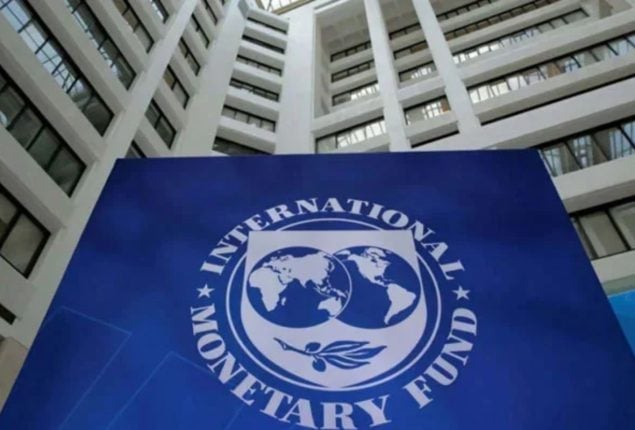IMF approves $3 billion standby agreement for Pakistan
WASHINGTON: The International Monetary Fund (IMF) approved the standby agreement for Pakistan,...

First review of IMF loan programme to Pakistan to begin on Nov 2
ISLAMABAD: The International Monetary Fund (IMF) has issued a report on the economic reforms programme after approving the $3 billion standby agreement for Pakistan.
The report said Pakistan’s economy was buffeted by significant shocks over the past year. The severe impact of the floods, commodity shock from the war in Ukraine, and the tightening of external and domestic financing conditions together with policy backsliding aggravated economic conditions and halted the post-pandemic recovery.
It said growth stalled, inflation surged, international reserves dropped to very low levels, and fiscal and external pressures have become acute. Despite some efforts in second half of the fiscal year, the difficult economic, social, and political environment as well as insufficient external financing have prevented sufficient progress in completing the Extended Fund Facility (EFF) which expired on June 30.
To address the challenges and sustain macroeconomic stability, it said the authorities have renewed policy efforts and are seeking support under a new stand-by arrangement. The IMF said the policies under the new program aim to support the immediate efforts to stabilize the economy and rebuild buffers.
The key policy pillars include (i) an appropriate FY24 budget to support needed fiscal adjustment; (ii) a return to a market-determined exchange rate and proper functioning of the foreign exchange (FX) market to absorb balance of payment (BOP) pressures and eliminate FX shortages; (iii) adequately tight monetary policy to support disinflation and anchor expectations; and (iv) continuation of structural efforts to strengthen energy sector viability, SOE governance, and the banking sector, while supporting efforts to build Pakistan’s climate resilience.
It said resolving Pakistan’s structural challenges, including long-term Balance of Payment pressures, will require continued adjustment and creditor support beyond the program period. It said a possible successor arrangement could help anchor the policy adjustment needed to restore Pakistan’s medium-term viability and capacity to repay.
Regarding the standby agreement, the IMF said Pakistan authorities have requested a nine-month standby arrangement (SBA) in the amount of SDR 2,250 million (111 percent of quota or about US$3.0 billion).
It said Pakistani authorities believe that the SBA can play a crucial role in rebuilding confidence by anchoring policies during the upcoming period and providing a framework that could catalyze support from multilateral and bilateral creditors, which is crucial for Pakistan to meet its large financing needs in FY24.
Regarding the risks, the report said Pakistan’s economic challenges are complex and multifaceted, and risks are exceptionally high. It said addressing them requires steadfast implementation of agreed policies, as well as continued financial support from external partners.
The IMF called for the consistent and decisive implementation of program agreements will be essential to reduce risks and maintain macroeconomic stability. The report said Pakistan will have to tighten monetary policy to reduce inflation, re-anchor expectations, and support external sector rebalancing through the exchange rate.
It said Pakistan authorities have generally been sanguine about inflationary pressures quickly receding and returning to their 5-7 percent inflation target range by end-FY25
Pakistan’s economy will suffer from a low growth rate, the report said. The GDP growth rate may be just 2.5 percent. It said Pakistan needs to increase foreign exchange reserves and remain committed to removing the remaining exchange restrictions when Balance-of-Payment conditions stabilize by the end of the program.
The report said the government will not take new loans from the State Bank of Pakistan. Furthermore, tax refund issues in FBR need to be resolved urgently.
The IMF also said the power sector circular debts need to be cleared. It said the circular debt in the energy sector has reached a new historical high of Rs 2.5 trillion (3 percent of GDP).
The drivers were policy slippages mostly from new unbudgeted, untargeted energy subsidies for exporters and agriculture, and some deferred tariff adjustments for certain residential consumers and slow progress with structural cost-side reforms.
It said Pakistan’s authorities took a set of corrective socially-balanced measures from March 2023 to contain both the FY23 budget subsidy (to 1.1 percent of GDP) and circular flow (to 0.4 percent of GDP) which increased deferred tariff adjustments and expand the base and level of the debt service surcharge and removed all new unbudgeted subsidies.
It added that partially available data suggest that the circular debt stock in the gas sector has also grown rapidly and is now almost on par with that in the power sector.
The inflation rate in Pakistan is expected to remain at 25.9%. The Inflation rate in Pakistan is 29.6% in fiscal year 2023 as compared to 12.1 percent in fiscal year 2022. The unemployment rate could be 8 percent in fiscal year 2024. The unemployment rate will be 8.5% in fiscal year 2023, as compared to 6.2 percent in fiscal year 2022.
Pakistan’s fiscal deficit is likely to be 7.5 percent of the economy. The volume of debt in Pakistan’s economy will remain at 74.9 percent. The government’s foreign exchange reserves will remain at 8.9 billion dollars.
IMF staff project Current Account Deficit of about US$4 billion in FY23, with a recovery both in exports and imports. The CAD will need to remain moderate at around 2 percent of GDP over the medium term, commensurate with projected official and capital flows and efforts to rebuild reserves.
Catch all the Business News, Pakistan News, Breaking News Event and Latest News Updates on The BOL News
Download The BOL News App to get the Daily News Update & Follow us on Google News.